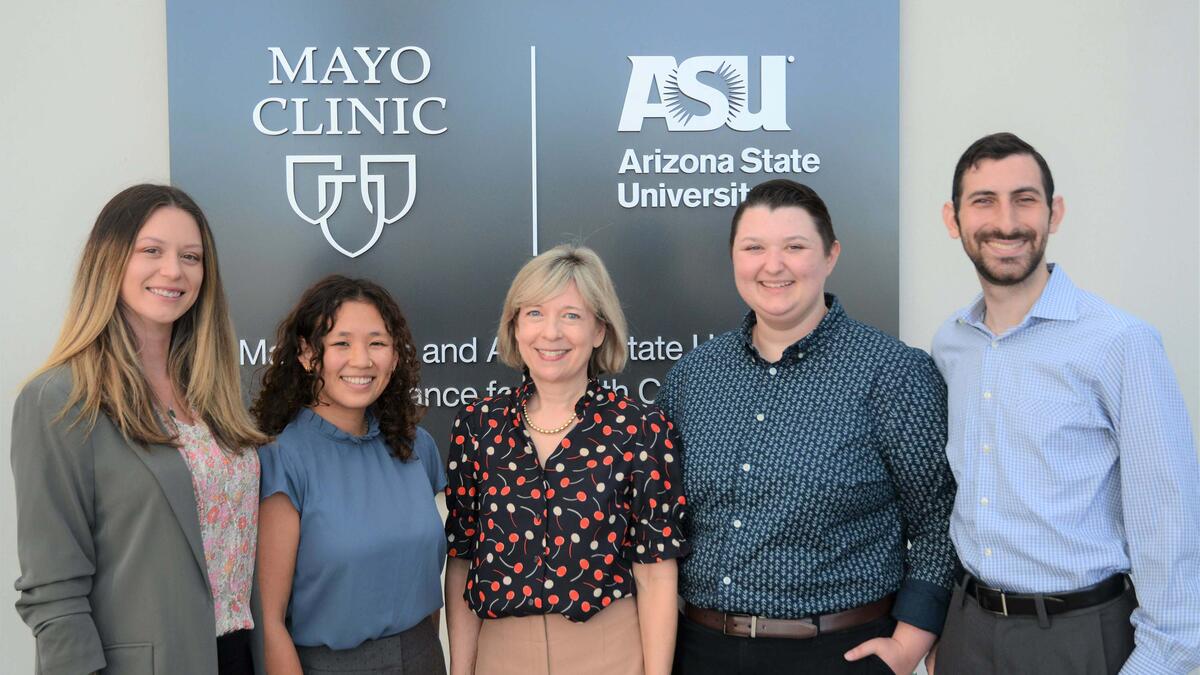ASU College of Health Solutions offers new master's degree in genetic counseling

MS in genetic counseling students (from left) Tessa Nelson, Cassidy Pedraza, Alyssa Rosetta and Daniel Gottlieb. Professor and Program Director Katherine Hunt Brendish is pictured in center. Photo courtesy College of Health Solutions
Genetic research has captured the public’s attention in recent years as scientists have made important discoveries resulting in promising treatments for a variety of diseases and conditions.
All of that groundbreaking research has led to a need for more genetic counselors to help patients understand their risk of a variety of genetic conditions and help alleviate some of the stress in making treatment decisions.
According to a 2020 National Society of Genetic Counselors Professional Status Survey, there are only 33 certified genetic counselors in Arizona. Of those, only 19 work full-time in direct patient care. With the recommendation of one genetic counselor per 75,000 people, Arizona should have 97 genetic counselors working in direct patient care.
The new Master of Science in genetic counseling degree from the College of Health Solutions at Arizona State University will fill this shortfall and important need.
Developed in collaboration with Mayo Clinic and accredited by the Accreditation Council for Genetic Counseling, the master’s degree in genetic counseling started this August with its first cohort of students. The full-time, two-year program is based in the College of Health Solutions with classes taking place at the Health Futures Center in north Phoenix.
The need for genetic counseling is expected to increase
Those pioneering students, and the ones who follow, will be prepared to step into a growing field.
Program Director and Clinical Professor Katherine Hunt Brendish said the new degree was created in response to demand for more genetic counselors.
“Genetics is a hot topic right now in general,” Hunt Brendish said. “Everyone is interested in genetics and genomics. And for students, I think the field is attractive because it’s a two-year master’s degree, and after graduation, there are a plethora of jobs.”
According to the U.S. Bureau of Labor Statistics, the field of genetic counselors is projected to grow by 18% from 2021 to 2031, much faster than the average for all occupations, with about 300 openings per year.
Genetic counselors need to be well rounded
Genetic counselors need expertise in both the science of genetics and counseling. In addition to helping patients understand and interpret risks and diagnosis, they collect information about family histories, order tests, educate about genetic disorders and serve as an advocate for patients and families.
“We’d like to have people who are very well rounded,” Hunt Brendish said. “Not just a high grade point average, but people who have experience in advocacy for communities, experience talking to people about genetics or volunteering in a field where you’re talking with people who are affected with a disorder or condition. We’re looking for candidates who have researched the field, have the background in science and understand what the job entails.”
In addition to the classroom time, the students will complete a rigorous schedule of clinical experience under the supervision of professionals working in the field. That’s part of the reason why the current class, four students, is so small.
Hunt Brendish said there are only about 50 accredited programs in the country, with each accepting between four to eight students per year. She said those students rely on a pool of about 5,000 professionals for their training.
“Right now, our accrediting body requires that the training be one-one-one with a genetic counselor in a clinic,” Hunt Brendish said. “So I’m asking the community genetic counselors to use some of their clinic time to train our students, and it’s very tricky. It’s chicken and egg, because we don’t have many genetic counselors in the city to train more students.”
For the students, the small class size has helped them forge a bond with each other and the faculty.
“I’m looking forward to the clinical rotations and going to the different conferences,” student Alyssa Rosetta said. “Overall, it’s been good. Everyone has been pretty accepting. It’s like a little family.”
More Health and medicine

Making medicine side-effect free
Many drugs that address medical conditions can come with serious side effects. In drug commercials, the litany of potential side…

Diagnostic research happening at ASU focused on detecting diseases earlier to save lives
It was one of America’s founding fathers, Benjamin Franklin, who may have foreshadowed today’s health care innovation when he…

Fighting the fungus among us
It starts with a spore.When inhaled, spores of the coccidioides fungus can cause coccidioidomycosis — better known as valley…

